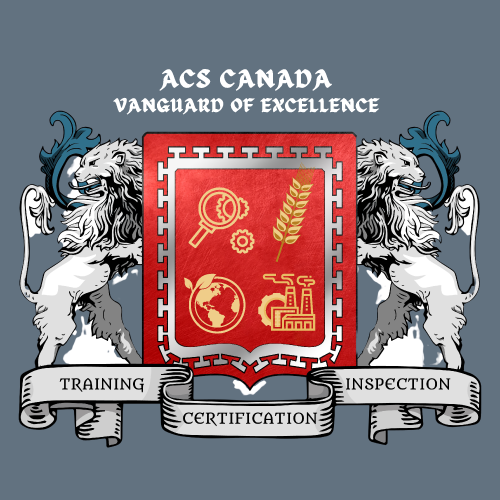FOOD APPROVAL CERTIFICATION

ACS Canada, as a leading certification body, offers food product approval that ensures compliance with stringent standards and regulations. The process for obtaining ACS Canada food product certification encompasses several key steps, aligning with the industry's best practices: 1. Preparing for ACS Canada Certification: Prior to certification, thorough understanding of ACS Canada's requirements and guidelines specific to the food product category is essential. This stage involves reviewing relevant regulations, collecting necessary documentation, and ensuring compliance with any prerequisite criteria. (Codex-AOAC) 2. Documentation Review by ACS Canada: The certifying body, ACS Canada, conducts a comprehensive review of provided documentation, including formulation details, ingredient specifications, processing methods, quality control procedures, and testing protocols. This step ensures that all essential information is available and aligns with ACS Canada's established standards. 3. On-Site Inspection: Highly trained auditors or inspectors from ACS Canada may perform an on-site visit to the food production facility. During this inspection, various aspects such as facility design, sanitation practices, pest control measures, storage conditions, and record-keeping procedures are thoroughly assessed. The purpose is to verify that the facility meets ACS Canada's stringent standards for food safety and quality. 4. Sample Collection and Analysis: In accordance with specific certification requirements, samples of the food product may be collected during the on-site inspection or at a separate sampling event. These samples undergo laboratory analysis using validated methods established by reputable organizations like AOAC. The analysis aims to determine compliance with specific parameters, such as nutrient content, microbiological safety, pesticide residues, or allergen levels. 5. Evaluation and Certification Decision: ACS Canada evaluates the compliance of the food product by considering the documentation review, on-site inspection findings, and laboratory analysis results. This comprehensive assessment determines whether the product meets the required criteria for safety, quality, labeling, and other relevant aspects. ACS Canada then makes a decision regarding the issuance of the certification. 6. Certification Issuance by ACS Canada: Upon successfully meeting all the necessary requirements, ACS Canada issues the food product certification. This certification serves as a formal recognition that the product has undergone a thorough evaluation and meets ACS Canada's rigorous standards, enhancing consumer confidence and trust.
7. Ongoing Compliance and Audits: ACS Canada's food certifications often involve regular audits or inspections to ensure ongoing compliance with the established standards. These audits may occur annually or periodically to verify that the certified product continues to meet ACS Canada's stringent requirements.
By obtaining food product certification from ACS Canada, companies benefit from a trusted certification body, industry-leading standards, enhanced consumer confidence, expanded market opportunities, and ongoing support in maintaining compliance and meeting evolving industry regulations.
ACS Canada's commitment to ensuring food safety, quality, and compliance with established standards makes them the ideal partner for companies seeking reliable and reputable food product certification.
Certifying your food product with ACS Canada offers a range of significant benefits that can elevate your brand and provide a competitive edge in the marketplace:
1. Credibility and Trust: ACS Canada is a reputable and globally recognized certification body. Obtaining certification from ACS Canada demonstrates your commitment to food safety, quality, and compliance with rigorous industry standards. This enhances your credibility, builds trust among consumers, retailers, and stakeholders, and differentiates your products from competitors.
2. Market Access and Expansion: ACS Canada certification opens doors to new markets and business opportunities. Many retailers, distributors, and food service providers prioritize products with recognized certifications, including ACS Canada. Certification can give you a competitive advantage, increase market access, and attract customers who actively seek certified food products.
3. Compliance with Regulatory Requirements: ACS Canada certification ensures your compliance with local, national, and international regulations governing food safety and quality. By meeting these standards, you mitigate the risk of non-compliance, potential legal issues, and product recalls. ACS Canada stays up-to-date with regulatory changes, helping you stay ahead of evolving requirements.
4. Enhanced Product Reputation: ACS Canada certification enhances the reputation of your food products. The certification emblem serves as a visible mark of quality and compliance, assuring consumers of your commitment to their health and well-being. This positive reputation can lead to increased consumer loyalty, positive word-of-mouth, and repeated purchases.
5. Improved Supply Chain Management: ACS Canada certification promotes best practices in supply chain management. It encourages suppliers and partners to meet stringent quality and safety standards, enhancing the overall integrity of your supply chain. This reduces the risk of contamination, ensures consistency in product quality, and strengthens relationships with suppliers and stakeholders.
6. Consumer Confidence and Satisfaction: ACS Canada certification instills confidence in consumers. It assures them that your food products have undergone rigorous evaluation, testing, and verification. This transparency and commitment to food safety generate trust, resulting in increased consumer satisfaction and loyalty.
7. Continuous Improvement and Innovation: ACS Canada certification promotes a culture of continuous improvement within your organization. By adhering to the certification requirements, you establish a framework for ongoing monitoring, review, and enhancement of your processes, products, and quality management systems. This fosters innovation, efficiency, and a commitment to excellence.
ACS Canada provides tangible benefits, including enhanced credibility, expanded market access, regulatory compliance, improved reputation, stronger supply chain management, increased consumer confidence, and a focus on continuous improvement. By partnering with ACS Canada, you demonstrate your dedication to producing safe, high-quality food products that meet the demands of discerning consumers and regulatory authorities.
Training at ACS Canada
ACS employs accelerated learning methods to ensure a comprehensive grasp of all certificates. Our approach involves contextualizing your learning through a wide array of options, including classroom instruction, workshops, as well as interactive and online sessions.
FOOD APPROVAL CERTIFICATION Training - 1
GMP Requirements

GMP – Requirements & Documentation
This course aims to teach the principles and practices of GMP requirements in the food industry.
More About This CourseFOOD APPROVAL CERTIFICATION Training - 2
LABORATORY INTERNAL AUDITOR

Laboratory Internal Auditor
This course aims to teach the principles of effective laboratory internal audits.
More About This CourseFOOD APPROVAL CERTIFICATION Training - 3
HACCP LEAD AUDITOR

HACCP – Lead Auditor
The aim of this course is to teaches the principles and practices of effective HACCP third party audits.
More About This CourseFOOD APPROVAL CERTIFICATION Training - 4
HACCP INTERNAL AUDITOR

HACCP – Internal Auditor
This course aims to teach the principles and practices of HACCP-GMP first and second-party audits.
More About This CourseFOOD APPROVAL CERTIFICATION Training - 5
HACCP REQUIREMENTS

HACCP – Requirements & Documentation
The aim of this course is to provide delegates with the knowledge and skills required to understand HACCP requirements and documentation.
More About This CourseFOOD APPROVAL CERTIFICATION Training - 6
FSMS ISO 22000 REQUIREMENTS

ISO 22000 – Requirements & Documentation
The aim of this course is to provide delegates with the knowledge and skills required to understand FSMS requirements and documentation.
More About This Course
